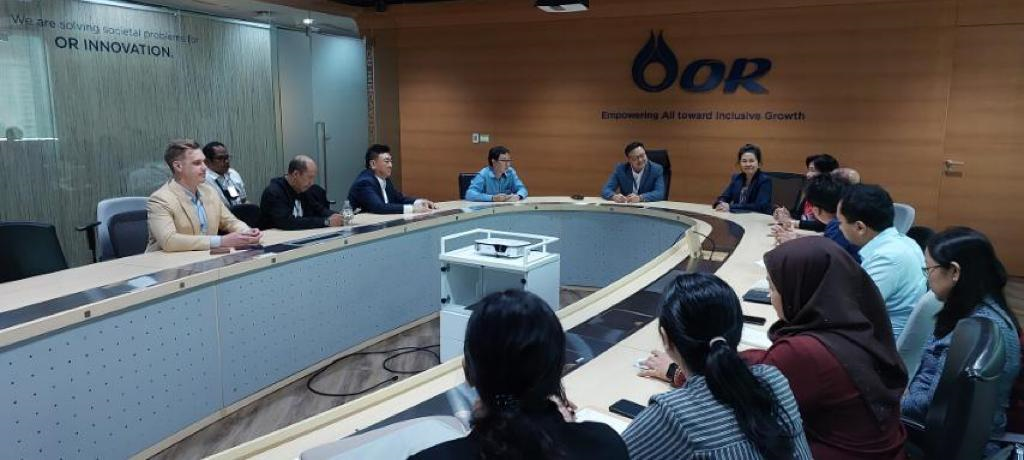The U.S. Grains Council (USGC) and PTT Group, the largest energy conglomerate in Thailand, recently co-organized an immersion tour to that country for nine officials from the Philippines Department of Energy to study the implementation of E20 fuel blends, first introduced to Thailand in 2008. The program was executed with two PTT Group subsidiaries – PTT OR (PTT Oil and Retail Business Public Company Limited), the group’s downstream business in Thailand, and PTT Philippines, the group’s downstream business in the Philippines.
The mission comprised meetings and site visits to PTT headquarters, retail stations, fuel terminals, a fuel laboratory and ethanol distilleries, as well as a courtesy visit to the Philippines Ambassador to Thailand. The timely program comes as the Philippines Department of Energy develops a new fuel standard for E20 blends and mulls the potential introduction of E20 to the Philippines – which implemented an E10 mandate in 2012.
The U.S. ethanol industry continues to be a major partner for the Philippines fuel industry, supplying roughly 40 percent of the country’s annual ethanol demand of 180 million gallons. The Philippines implemented an E10 mandate in 2012 and is evaluating an expansion of its fuel ethanol policy to include an E20 product.
“The immersion study proved to be a productive platform for knowledge exchange between regional ethanol policymakers, regulators and industry, particularly with respect to the roll out of E20,” said Chris Markey, USGC assistant regional director for Southeast Asia and Oceania. “We thank the Philippines Department of Energy, PTT OR, PTT Philippines, KTIS Bioethanol, GKBI, the Thailand Ethanol Manufacturing Association and the Embassy of the Republic of the Philippines in Thailand for making this mission possible.”
The mission began with a visit to PTT OR’s flagship retail station and headquarters in Bangkok, where the delegation surveyed retail infrastructure for higher ethanol blends and met with PTT OR executives to better understand the commercial, technical and regulatory considerations for retailers selling E20 in Thailand.
The delegation then visited PTT OR’s Monitoring and Quality Management Laboratory to witness firsthand the company’s testing and quality control operations. After discussing best practices for monitoring, compliance and quality control for E20 blends, the delegation then met with the management team of PTT OR’s truck and vessel fuel terminals serving the greater Bangkok area to survey the facilities and better understand midstream requirements and considerations for higher ethanol blends.
The mission ended with a visit to the Nakhon Sawan Biocomplex in central Thailand, home to KTIS Bioethanol and GKBI. KTIS Bioethanol, one of Thailand’s largest producers of ethanol from molasses, provided the delegation an in-depth look at ethanol production in the country, including a comparative analysis of the ethanol industries in Thailand and the Philippines. GKBI, a joint venture between KTIS Bioethanol and PTT Group subsidiary Global Green Chemicals, showcased to the delegation the potential for ethanol in value-added decarbonization products. The facility, which opened last year, produces ethanol from sugarcane juice and plans to use the finished product as the feedstock for manufacturing bioplastics.
Thailand itself is one of the region’s leading producers and consumers of fuel ethanol, launching a fuel ethanol program in 2004. The country produces and consumes 350 million gallons of fuel ethanol per year. The country does not allow imports or exports of fuel ethanol.
The Government of Thailand aims to reduce greenhouse gas emissions by 282 metric tons of carbon dioxide (MTCO2) in the energy and transportation sectors by 2050 – a 40-percent reduction in emissions from baseline levels – and sees ethanol as a tool to help underpin these efforts, striving to consume roughly 700 million gallons of ethanol per year by 2037 via gasoline and sustainable aviation fuel (SAF).
About The U.S. Grains Council
The U.S. Grains Council develops export markets for U.S. barley, corn, sorghum and related products including distiller’s dried grains with solubles (DDGS) and ethanol. With full-time presence in 28 locations, the Council operates programs in more than 50 countries and the European Union. The Council believes exports are vital to global economic development and to U.S. agriculture’s profitability. Detailed information about the Council and its programs is online at www.grains.org.

